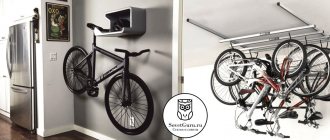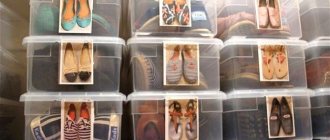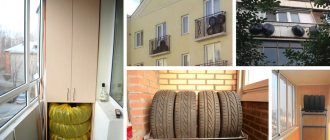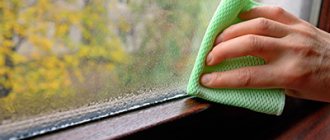With the end of the season, the summer residents went to the city for the winter and left their household appliances behind. Well, why not carry the refrigerator back and forth, really? This material talks about what dangers electrical appliances may face in your absence.
When leaving your dacha for the winter season, remember: household appliances left there can become a victim not only of dacha thieves, but also of low temperatures. And if in the first case, summer residents try to take care of the safety of their property, then many do not pay attention to the effect of low temperatures on appliances. But in vain!
- Preparing your cottage for winter - 15 important things you might have forgotten about
Closing the dacha for the winter: check if you have done everything?
Is it possible to leave a TV at the dacha for the winter? Is it possible to store an LCD TV on the balcony in winter?
Very often, balconies are used as places to store things.
A situation may arise when you need to make repairs in the room, but there is nowhere to put things and they are also sent to the loggia. Many apartment owners make a competent storage system and create the necessary conditions that allow things to winter on the balconies. If necessary, you can leave the TV on the balcony. However, it is advisable to organize a place where he will wait out the winter. This could be a special wardrobe - a compartment. It will not only accommodate a lot of things, but will also give the balcony an aesthetic appearance, since things will not be piled up haphazardly. If it is not possible to build furniture for storing things on the loggia, then it is advisable to store the TV receiver in its original packaging. It will protect the TV from various debris and protect it from mechanical damage. It is not advisable to store in plastic bags. This can lead to the accumulation of liquid, which negatively affects the TV receiver and can lead to its failure.
If the loggia or balcony is glazed, then they must be regularly ventilated so that excessive humidity does not arise in them. Thus, you can store any things on the balcony. It is advisable to make a good storage system that will prevent clutter in the room and prevent possible damage to things. The most ideal option would be to glaze and insulate the loggia, then you won’t have to worry about the safety of your TV and other household appliances.
Features of storage of various types of devices
If your choice is a robot vacuum cleaner, then you don’t have to worry about where to store it. All models of this type are compact, lightweight and do not require much space.
There are also small mini-vacuum cleaners that also do not take up a huge amount of space in the room. Modern models often have the function of securing the hose around the vacuum cleaner and various clamps for convenient placement of nozzles, which greatly helps save space. Vacuum cleaners can be presented in a horizontal or vertical position. Vertical models in the form of a finished brush or mop deserve special attention.
Thus, the rules for maintaining equipment depend primarily on the dimensions of the model and how compact its assembly is possible.
Operating temperature of LED TVs. Proper use and care of the TV
Today it is difficult to find an apartment that does not have a TV. Plasma, LCD, LED are devices that, in addition to operation, also need to be maintained. But not every user knows what kind of care such devices need, how to clean them and keep them in working order. If this is done correctly, then such equipment will last a long time without repair. If a breakdown does occur, you need to solve this problem in a specialized service center.
So why should the user pay close attention?
Humidity and temperature in the room play a big role here. Experts say that, for example, an LED TV does not need repair at all, but this is only if this device is operated at normal humidity levels and room temperature. Conversely, if this TV is operated in a room in which these conditions are violated, it will quickly fail. When the room where this device is located is quite low in temperature, the response time and brightness will be affected. Naturally, it is impossible to achieve high-quality images from such a device. By the way, an LCD TV will also end up in a repair shop if there are sudden changes in temperature. The result of such operation will be the appearance of drops (condensation) on the surface of the device. This is very harmful, especially for the polarizer on the LCD matrix. This problem will inevitably lead to a decrease in the quality of the TV receiver. And the result is a trip to the service center to troubleshoot problems. And this work is performed only by specialists.
Where it is strictly not recommended to keep a vacuum cleaner
It is best if the vacuum cleaner is located in a well-heated and dry room. It is not advisable to store it in the bathroom, because water constantly evaporates and moisture accumulates there. The same goes for basements and garages, where it is often very damp. In any case, even if the vacuum cleaner takes pride of place on your balcony in the summer, it is recommended to move it to another place in the house for the winter. Choosing a suitable room guarantees long and reliable operation of the equipment. These rules also apply to other large and small household appliances.
At what temperature can you turn on the TV? Re: Transporting a TV in cold weather.
LG writes in the instructions for TVs the conditions for their storage and operation. I don’t know which model you will order, but, for example, the instructions for the OLED 55B8 model say: “Storage temperature from -20°C to 60°C.” But I think things don’t get to such extreme temperatures in warehouses. In my opinion, the most important thing here is how to turn on the TV correctly after a cold day. When you bring a cold body into the heat, moisture naturally condenses on it (since at the same absolute humidity, as the temperature decreases, the relative humidity increases and when it reaches 100%, moisture condenses on the cold surface) - that’s why within two hours after after the TV has been brought in from the cold, it is better not to turn it on (for the first couple of minutes, until condensation has formed, you can turn it on for a minute or two to check), so that a short circuit does not occur anywhere on the board (which, however, is unlikely, because condensation - practically distilled water is a poor conductor). Condensation evaporates at a rate depending on the temperature and humidity in the room, but as a rule, this process does not last longer than a couple of hours, after which you can safely turn on the TV. If you want to play it safe, you can turn on the heater in the room and raise the temperature to 27-30 degrees, which will significantly reduce the relative humidity and speed up the evaporation of condensation (or reduce to zero the likelihood that the condensation will still not evaporate within two hours). That's all.
Cathode ray tube television
Like more modern types of TVs, CRTs are also sensitive to moisture and temperature changes. In addition, they have a more bulky design that can accumulate large amounts of dust. When leaving a CRT device for the winter, it is first of all advisable to thoroughly blow it out with a vacuum cleaner, and then cover it with a thick blanket, which allows you to balance the temperature difference in the room. This device must be left on a reliable basis (bedside table, table, etc.). Before starting up after a long period of inactivity, it is a good idea to dry the TV, as condensation may accumulate on its parts, negatively affecting its elements.
It is important to remember that the main enemies of electronic equipment are dust, moisture and insects, of which there are usually a lot in the countryside. So, when leaving devices for the winter, it is worth protecting them from getting these components inside. However, televisions should never be covered with plastic bags or other waterproof materials. They are the ones who are able to accumulate condensing moisture inside, which can get on the parts. And all devices must be de-energized to avoid short circuits.
After winter storage, the TV must first be ventilated by allowing it to stand for a couple of hours in a ventilated area. When turned on, there should not be any clicks or other extraneous sounds indicating the presence of moisture on the boards. If they appear, it is worth blowing out the device more thoroughly, preferably with a vacuum cleaner. In addition, it is worth checking the cord to ensure that there is no damage to the outer insulation. If everything is in order, then the device can be safely turned on.
Source
Operating conditions for the TV. Correct operation: how to avoid breaking the TV
Often, ignorance of the correct operation of the TV leads to it breaking down, sometimes even beyond the possibility of repair. To avoid such situations, you need to know how to use the TV.
Basic rules of use
First of all, you need to know how to properly arrange equipment in the room:
- Do not place the TV close to the edge of the bedside table.
- There is no need to let the wires from the TV out so that you could trip on them and pull the TV out of the niche.
- Check the strength of the brackets and their stability if the TV is hanging on the wall.
- Avoid direct sunlight on any surface of the TV.
- Place any equipment away from heating appliances.
If you neglect such simple rules, then there is a high probability of falling or damaging the TV.
Proper connection is also important, since sudden power outages, power surges and even emergency situations such as lightning strikes occur even in the best areas. It’s worth protecting yourself in this case by connecting the TV not directly to the outlet, but using a high-quality surge protector.
In addition, if you need to switch cable TV or Internet cables, you need to be careful not to break the socket.
A TV is often used as a stand for something, especially if it has fairly wide parts. Such treatment of the TV can lead to a variety of consequences, so you should not load the TV case with anything unnecessary. Do not forget that if the TV does not have a very high stand, you should not place vases filled with water nearby, which can be tipped over on the equipment and thereby shorten its service life.
Subtleties of smart TV operation
The smart TV is literally packed to the brim with all sorts of applications and has a wide range of capabilities, from watching paid channels on the network to using your own flash cards or any gadgets for viewing media, a module for wireless Internet connection, etc. . The wide capabilities of such technology also include quite serious problems, starting with downloading a virus onto the TV from external media and ending with the inability to update completely, which prevents the operation of the equipment.
To avoid such situations it is necessary:
- Scan all connected drives for viruses.
- Do not turn off the Internet on the TV.
- Delete unnecessary applications, for example, those installed on the TV by a set-top box that you no longer use.
- Do not change the original settings without understanding their purpose.
- Use the services of consultants if manual settings are necessary.
- Avoid connecting a maximum number of devices at the same time, as the TV may overheat.
What to do if the equipment breaks down?
If you were unable to protect your TV from breakdown - no problem, you can contact https://service-remont.com.ua/monitors-tv/tv/ for quality help from specialists, which includes diagnostics, coordination of repair work, work masters and guarantee. A professional will also advise on the topic of TV breakdown and avoiding similar situations in the future.
You shouldn’t try to fix a broken TV yourself, since without the proper knowledge you can not only break the equipment, but also render it completely unusable. It’s also not worth reinstalling the software yourself, since ignorance can play a really bad role here too.
How to prepare summer tires for storage
First, the wheels need to be thoroughly washed and dried. After this, a storage decision is made - where to store it, with or without disks.
There are now special storage cases on sale where you can put tires for the winter. Fabric accessories allow air to pass through, but special boxes are also suitable for summer tires. Winter tires cannot be left in them, as the box quickly becomes warm.
It is imperative to check the tires for defects. It is likely that there are some punctures or ruptures in the rubber, in which case it can be sent for disposal, since severe damage makes the tires unsuitable for further use.











